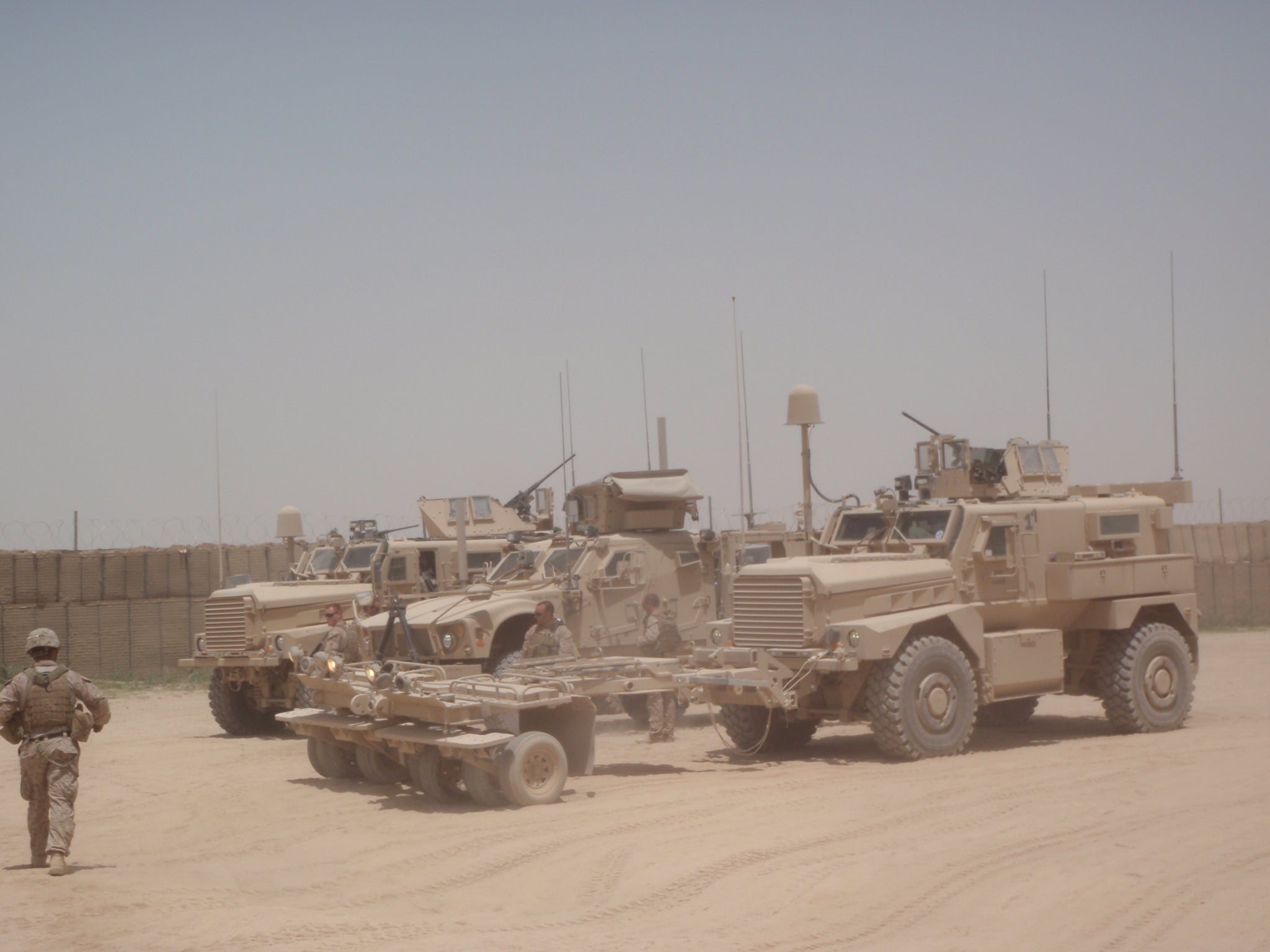Iraq War Exposure Attorneys
Posted by
Berry Law
on
July 29, 2021 in
Veterans Disability
Iraq War Disability Attorneys
It is possible that Iraq War veterans were exposed to a variety of environmental and chemical hazards during their service that could lead to serious health issues.
Berry Law can help.
Berry Law is a veterans-serving-veterans team of attorneys who are dedicated to helping veterans of the Afghanistan War get the VA benefits and compensation they need if they are suffering from illnesses related to military service in the war. We serve veterans across the nation.
How Berry Law Can Help Iraq War Veterans
You are an Iraq War veteran who served your country to protect and defend the rights and the way of life that the American people have enjoyed for over 200 years.
If you were injured or are suffering from health issues or diseases related to your service in the Iraq War, Berry Law wants to help you get the full benefits you deserve.
Our practice is made of veterans just like you, and we are 100% dedicated to serving veterans across the country in getting the VA benefits they are entitled to.
Call Berry Law today or contact us online for a free consultation about your veteran’s compensation claim.
Learn More About Our Team
Types of Exposure in the Iraq War
According to a public health report from the Department of Veterans Affairs (VA), there were many risks of exposures during the Iraq War that created immediate or could cause severe, long-term health issues, including injuries and diseases.
Some of them include:
- Depleted uranium
- Noise
- Toxic embedded fragments
- Infectious diseases
- Rabies
- Traumatic brain injury (TBI)
- Sand, dust, and particulates
- Chromium (Qarmat Ali)
- Chemical warfare agents (OIF)
- Sulfur fire (Al Mishraq)
If you were exposed to any of these during your service, please contact Berry Law today for a free consultation about your potential right to VA benefits.
Symptoms of Iraq War Exposures
Symptoms of these exposures may include the following:
- Depleted uranium –
Depleted uranium can pose health issues if it enters the body through an embedded fragment, inhalation, contaminated wounds, or ingestion. Depleted uranium usually stays in the body instead of exiting it as most chemical agents do. Iraq veterans with high concentrations of depleted uranium may experience a significant negative impact on their kidney function. - Noise –
The noise of war can be deafening and includes explosives, jets, machinery, gunfire, rockets, aircraft, and heavy weapons. Exposure to this kind of noise for Iraq veterans may result in permanent hearing loss or persistent tinnitus (ringing in the ears). - Toxic embedded fragments –
Iraq War veterans who suffered blast injuries that left shrapnel embedded in their bodies may have health problems from the lingering effects of the toxins. Injuries include the actual impact and any chemicals from the shrapnel that entered the bloodstream and can affect the rest of the body. - Infectious diseases –
There are nine infectious diseases that Iraq War veterans may have been exposed to:
Examples include:- Malaria – An infectious disease with symptoms that include persistent fevers, sweats, and chills.
- Brucellosis – A bacterial disease in which symptoms manifest as chronic profuse sweating and joint and muscle pain.
- Campylobacter Jejuni – A bacterial disease that includes symptoms of chronic diarrhea, abdominal pain, and fever.
- Coxiella Burnetii (Q Fever) – A bacterial disease with symptoms that include nausea, diarrhea, fevers, and severe headaches. Heart inflammation may occur in chronic cases.
- Mycobacterium Tuberculosis – A bacterial lung disease in which symptoms appear in the form of fevers, weight loss, persistent and sometimes bloody coughing, and chest pain.
- Nontyphoidal Salmoneela – A bacterial gastrointestinal infection that includes symptoms of nausea, diarrhea, and vomiting.
- Shigella – A bacterial gastrointestinal infection with symptoms that include fevers, diarrhea, nausea, and vomiting.
- Visceral Leishmaniasis – A parasitic disease that could cause death if it is not treated. Symptoms manifest as weight loss, fevers, anemia, and enlargement of the liver and the spleen.
- West Nile Virus – A mosquito-borne virus that includes symptoms of headaches, fevers, nausea, vomiting, and muscle pain or weakness. Symptoms can vary in severity.
- Rabies –
Iraq War veterans may have been exposed to rabies through the saliva of an infected warm-blooded animal they came in contact with during the war. Rabies is an extremely serious viral infection that often doesn’t have any immediate symptoms. Rabies usually can’t be successfully treated once symptoms emerge, with death occurring in a few days. These symptoms include insomnia, hallucinations, delirium, anxiety, difficulty swallowing, mild or partial paralysis, confusion, increased salivation, and fear of water. - Traumatic brain injury (TBI) –
It is not uncommon for Iraq War veterans to have experienced TBIs because of their close proximity to explosions during the war. Improvised explosive devices (IEDs) are usually the source of most TBIs suffered by Iraq War veterans. Immediate symptoms include confusion, temporary loss of memory, dizziness, “seeing stars,” and loss of consciousness or the sensation of being knocked out. Long-term symptoms include chronic headaches and neck pain, chronic fatigue, light or noise sensitivity, blurred vision, tinnitus, problems with concentration and organization, chronic depression, anxiety, and apathy, and slowed thinking, speaking, and reading. If the TBI is severe enough, dementia may eventually occur. - Sand, dust, and particulates –
Iraq War veterans often were exposed to pollution, dust, sand, and other airborne particles because of the environment in Iraq. Large particles can usually be expelled by coughing or sneezing, but fine particles can get embedded in the lungs and airways, leading to severe respiratory problems. Symptoms include skin, eyes, nose, and throat irritation, as well as cough, shortness of breath, and a runny nose. - Chromium –
Iraq War veterans who guarded a water-treatment facility in the Basrah oil fields at Qarmat Ali likely suffered exposure to toxic hexavalent chromium through inhaling contaminated sodium dichromate dust. Symptoms of exposure include nasal ulcers, nosebleeds, runny or itchy nose, holes in the nasal septum, sneezing, skin ulcers, asthma, and skin irritations. - Occupational hazards –
Iraq War veterans may have had exposure to hazardous chemicals or environmental factors because of their work. Symptoms can range from skin irritation, nose irritation, and eye irritation, to more serious health issues, including respiratory diseases, poisoning, and even death. - Chemical warfare agents (OIF) –
Iraq War veterans may have come into contact with mustard or nerve agents while they were handling or destroying explosive ordnance. The severity of symptoms is commensurate with the level of exposure. If exposure is low, the agent may blister the skin or cause little to no damage to nerves. If exposure is high, the agent may cause permanent lung and respiratory damage or immediate coughing, breathing problems, unconsciousness, seizures, paralysis, coma, and death. - Sulfur fire (Al Mishraq) –
Iraq War veterans who were serving in Al Mishraq in June 2003 were likely exposed to some level of sulfur dioxide from a month-long fire at the Mishraq State Sulfur Mine Plant. Low-level exposure symptoms include respiratory and eye irritation. High-level exposure symptoms can burn skin and cause fluid to accumulate in the lungs (pulmonary edema), insufficient supply of oxygen to the body (hypoxia), and serious airway obstruction.
Types of VA Disability Claims for Iraq War Veterans
Our experience shows that the types of claims that veterans most often successfully appeal involve:
Other types of claims we investigate for Iraq War Veterans:
Benefits Iraq War Veterans May Be Eligible to Receive
Iraq War veterans who were exposed to environmental and chemical hazards during their service and who received lasting injuries, diseases, and health problems as a result may qualify for disability compensation through the VA.
If you believe you may be entitled to disability compensation through the VA, please contact Berry Law for a free consultation today.


